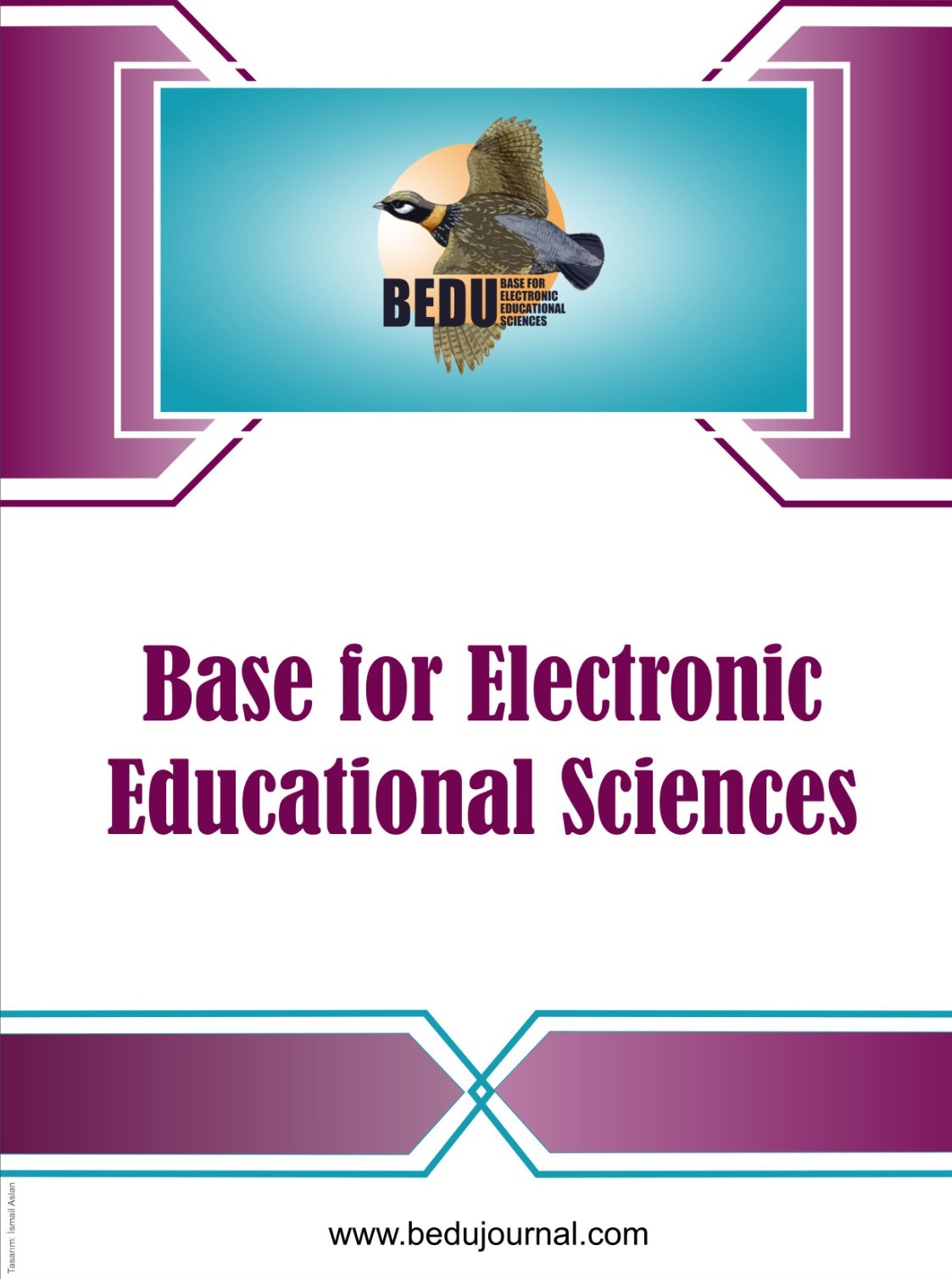Research article | Open Access
Base for Electronic Educational Sciences 2024, Vol. 5(2) 119-132
Investigation of Primary School Teachers Opinions on the Use of Augmented Reality Supported Course Materials
pp. 119 - 132 | DOI: https://doi.org/10.29329/bedu.2024.1064.7
Publish Date: September 30, 2024 | Single/Total View: 125/165 | Single/Total Download: 148/185
Abstract
Augmented reality (AR) technology is seen as a factor affecting teaching processes with digital transformation. In this context, the main purpose of this research is to determine the views of primary school teacher on the use of augmented reality supported course materials. The research was conducted with a case study design in accordance with the qualitative method. The study group of the research consists of 25 primary school teacher working in the Lüleburgaz district of Kırklareli province in the 2022-2023 academic year. The research data were collected by focus group interview technique using a semi-structured interview form.
Based on the analysis of the findings of the research; it is possible to say that the participants lack knowledge and misconceptions about AR teaching materials, that the participants cannot use AR-supported course materials in lessons because they find their own digital skills insufficient, and that teachers need applied training to improve their digital skills. In the case of using AR materials, it was determined that they tended to use them as an attention-grabbing tool in the introduction of the lesson, to visualize Mathematics and Science lessons, and to eliminate the lack of materials in the lessons. Considering the primary school program and classroom conditions, it was concluded that AR-supported course materials will become useful only with laboratory environments to be established in schools.
Keywords: Augmented Reality Technology, Teaching Materials, Classroom Teachers, Digital Revolution
APA 7th edition
Ozkan, D., & Guven, B. (2024). Investigation of Primary School Teachers Opinions on the Use of Augmented Reality Supported Course Materials. Base for Electronic Educational Sciences, 5(2), 119-132. https://doi.org/10.29329/bedu.2024.1064.7
Harvard
Ozkan, D. and Guven, B. (2024). Investigation of Primary School Teachers Opinions on the Use of Augmented Reality Supported Course Materials. Base for Electronic Educational Sciences, 5(2), pp. 119-132.
Chicago 16th edition
Ozkan, Damla and Bulent Guven (2024). "Investigation of Primary School Teachers Opinions on the Use of Augmented Reality Supported Course Materials". Base for Electronic Educational Sciences 5 (2):119-132. https://doi.org/10.29329/bedu.2024.1064.7
Akgün, E., & Ustun, A. B. (2023). Content analysis for learning with mobile augmented reality. Dokuz Eylül University Buca Education Faculty Journal (56),362-383. https://doi.org/10.53444/deubefd.1153240
Akpınar,E and Urhan, O. (2017). Prospective teachers' views on augmented reality applications in education. 5th International Instructional Technologies & Teacher Education Symposium, Izmir, Turkey. https://www.ittes.org.tr/
Al-Amri, A. B., & Almaghrabi, F. M. (2020). The Effectiveness of a Program Based on Blended Learning in Developing the Skills of Producing the Augmented Reality Technology among Students of Saudi Universities. i-Manager's Journal of Educational Technology, 17(1), 1.
Aytaçlı, B. (2012). A detailed look at case study. Adnan Menderes University Faculty of Education Journal of Educational Sciences, 3 (1), 1-9.
Azuma, R. T. (1997). A survey of augmented reality. Presence: Teleoperators and virtual environments, 6 (4), 355-385.
Baltacı, A. (2019). Qualitative research process: How to conduct a qualitative research. Ahi Evran University Journal of Institute of Social Sciences, 5(2), 368-388.
Billinghurst, M. ve Duenser, A. (2012). Sınıfta Artırılmış Gerçeklik. Bilgisayar,45,56-63. https://doi.org/10.1109/MC.2012.111
Carmigniani, J. and Furht, B. (2011) Augmented Reality: An Overview. In: Furht, B., Ed., Handbook of Augmented Reality, Springer, New York,3-46.https://doi.org/10.1007/978-1-4614-0064-6_1
Creswell, J. W. (2007). Qualitative İnquiry & Research Design: Choosing Among Five Approaches ( 2. Baskı). USA: SAGE Publications.
Çakmak, A. (2015). Investigation of the place of television, computer, book and toy in the lives of kindergarten children. [Unpublished master's thesis], Gaziantep University Institute of Educational Sciences, Gaziantep.
Çiloğlu, T., Yılmaz, Ö., Yılmaz, A., Karaoğlan, F. (2021). Examination of articles on augmented reality in education. Journal of Ahmet Keleşoğlu Faculty of Education, 3(2), 147-158.
Çokçalışkan,H.(2024). Evaluation of the effects of augmented reality applied course design on students' spatial abilities. PhD Thesis, Gazi University Institute of Educational Sciences, Ankara.
Denzin, N. K. & Lincoln, Y. S. (Eds) (1994). Handbook of Qualitative Research. Thousand Oas, CA: Sage Publications
Özdemir, S.M. (2009). Curriculum evaluation in education and examination of studies on curriculum evaluation in Turkey. Yüzüncü Yıl University Journal of Faculty of Education 6(2), 126-149.
Öztürk, M. A., & Erdem, M. (2020). The relationship between primary school teacher workload perception and professional burnout levels. Van Yüzüncü Yıl University Journal of Faculty of Education, 17(1), 926-958. https://doi.org/10.33711/yyuefd.751859
Sontay, G., & Karamustafaoğlu, O. (2021). Students' views on the use of augmented reality technology in teaching science. European Journal of Educational Sciences, 8(4), 1-14.
Subaşı, M., & Okumuş, K. (2017). Case study as a research method. Atatürk University. Journal of Graduate School of Social Sciences, 21(2), 419-426.
Türksoy, E. & Karabulut, R. (2020). Teachers' opinions on the applicability of digital reality technologies in science centers. Nevşehir Hacı Bektaş Veli University SBE Journal, 10(2), 436-452.DOI: 10.30783/nevsosbilen.657167
Wu, H. K., Lee, S. W., Chang, H. Y., & J. C. (2013). Current status, opportunities and challenges of augmented reality in education. Computers & Education, 62, 41-49.
Yıldırım, A. & Şimşek, H. (2021). Qualitative research methods in social sciences (12th Edition). Seçkin Publishing.
Yin, R. K. (2017). Case study research applications (Translation: Prof. Dr. İlhan Günbayı). Translation from 3rd edition. Ankara: Nobel Academy.
